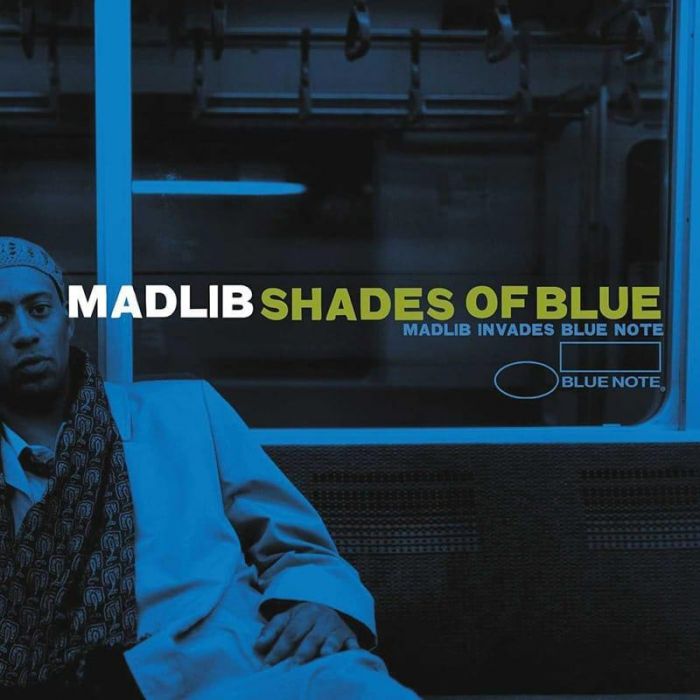Shades of Blue: Madlib Invades Blue Note by Madlib (Review)

Not too long ago, what must have been a dream came true for Madlib. He was given access to the vaults of the prestigious Blue Note jazz label, to decades of recordings with permission to sample them and craft something new and unique for his new album. Now that’s quite a bit to entrust to someone, even a producer as acclaimed as Madlib, so who can blame Blue Note if they were a bit, shall we say, concerned? So sprinkled throughout Shades of Blue are numerous phonecalls from people associated with the Blue Note label (Melvin Sparks, Reuben Williams, Leon Spencer) inquiring about the album’s progress, expressing interest as to how, exactly, Madlib would be reworking their music.
More than likely, the calls were just out of sheer professional curiosity. However, if the callers’ intent was to check up on Madlib, to ensure that he didn’t do anything sacreligious to the Blue Note legacy, then they probably breathed a collective sigh of relief upon hearing the finished product.
Madlib does nothing to screw with Blue Note’s recordings. Nothing whatsoever. Shades of Blue is a very safe and careful album, reverent even (more than one of the songs espouses the importance of Blue Note to the world of jazz — i.e. “Blue Note Interlude”). Perhaps too reverent, as is indicated by the amount of namedropping. (We got it, Madlib — you worked with famous musicians. Enough already!)
But all of the reverence in the world can’t make Shades of Blue an interesting album. Sure, the album’s overall relaxed tone implies that it’d be perfect background music for swank chill-out sessions. I’m sure there are plenty of hipsters out there who will dig Shades of Blue for one of their next parties, where everyone lounges around the posh digs, drinking mixed drinks and carrying on conversations until the wee hours of the morning. But as I listened to it closely, I was surprised at how blase it was.
Shades of Blue is smooth, no doubt about that. So smooth, in fact, that it barely leaves any impression on its way down.
Maybe I’ve just listened to too much of DJ Shadow’s Endtroducing, RJD2, and The Avalanches, but I kept expecting to hear Madlib throw in something indicative of his fabled skills, anything to spice it up a bit… but there’s nothing. The jazz elements are never screwed with, never toyed with, never gutted to the point of unrecognizability so that Madlib can reform them into something fresh and exciting. At least, not in any perceptible way, though I’m sure someone more intimately familiar with the source material than I could point out Madlib’s manipulation.
But to these ears, it feels like the album’s formula is pretty basic: take the source songs, layer them over canned beats and scratches, and throw in the occasional MC or sample either giving props to Madlib (given the amount of respect paid to Blue Note, there’s also an amazing amount of self-aggrandizement that occurs as well) or encouraging the crowd to get their groove on (“Montara”).
With its rubbery bassline, “Mystic Bounce” somewhat lives up to its title. But Madlib allows the bassline to slip into a rut alongside watery vibes, mellow beats, and crowd samples. “Please Set Me At Ease” starts off promisingly, with a gorgeous harp intro followed by mellow wah guitar, graceful piano, and some nice and nasty bass squelches. There’s a lot of potential within those sounds. But unfortunately, the song merely devolves into a hip-hop therapy session as jilted lovers air out their grievances (albeit in silky smooth voices).
However, the album is not a total loss. There are moments interspersed throughout that do cause my ears to perk up. Despite the track’s shortcomings, “Please Set Me At Ease” does have a gorgeous denouement where Madlib introduces a graceful piano line over shifting rhythms, creating one of the album’s most enjoyable and engaging moments. On the dense “Funky Blue Note,” Madlib sends a flute soaring joyously over cavernous rhythms and pumping organs.
Meanwhile, “Stepping Into Tomorrow,” with its stomping beat, horn stabs, and dirty organwork, sounds like some longlost blaxploitation score that’s been brushed off and given a modern overhaul (just ignore the lame intro). Elements of Tortoise can be heard in “Song For My Father,” if the post-rock poster children had been recording back in 1964, and Herbie Hancock’s wet analog gurgles and bizarre synth undercurrents on “Peace/Dolphin Dance” hint at Supersilent’s font of inspiration. But as much as I dig these tracks, they can’t salvage the entire album for me.
Given the amount of care that Mad Lib shows towards the Blue Note recordings, as well as the numerous references to Blue Note’s history and luminaries, it’s obvious that Shades of Blue is a labor of love, a way to pay homage to the sounds that inspired him. I just wish I found his particular interpretations as inspiring.